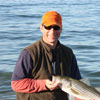How to Prevent Soft Plastics from Becoming an Environmental Nuisance
By Tom Keer
Mar 13, 2014
A bit over a year ago, Maine state representative Paul Davis proposed legislation prohibiting the use of all plastic worms for recreational fishing.
A bit over a year ago, Maine state representative Paul Davis proposed legislation prohibiting the use of all plastic worms for recreational fishing. The proposal was hit with criticism by groups like B.A.S.S and the American Sportfishing Association until more research was conducted to see if the plastic/rubber worms were truly harming the environment. Biologists completed a study finding that plastic worms were not enough of an issue and that legislation was not needed at that time. What many people, myself included, took away from this event was really two fold. The first was that soft plastics do not break down over time; second, since they don’t decompose, we can consider them litter.
If we’re not part of the solution then we’re part of the problem, and we’ve seen this situation before. Instead of tossing cans and bottles out of the window of our cars, folks should bring ‘em home and discarded them in the garbage can. Problem solved. As it pertains to rubber worms/baits, same thing. We can have an impact on the environment as well.
Here’s how:
-
Rather than throw used plastics overboard just bring them back to the dock and pitch them in the trash can.
-
Put ‘em in your vest or your tackle box.
-
Use the proper hooks and rig them correctly so they don’t fly off when you make a cast.
-
Change up torn baits and replace them with new ones. There will always be bits and pieces that don’t make it into the boat and that’s just part of fishing.
It sounds like an easy fix to me, and it’s no different than some of the other conservation measures we have in place. We don’t toss soda cans overboard. We don’t leave used monofilament on the bank. Non-toxic weights are common, and they are being widely used. The solution lies with us and if we pick up after ourselves then we won’t need legislation. Maybe then we can focus on other issues that need to be addressed, like improved fish stocks and more open space. I’d like that very much, wouldn’t you?









